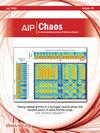最小描述长度原理油藏计算。
IF 2.7
2区 数学
Q1 MATHEMATICS, APPLIED
引用次数: 0
摘要
我们使用最小描述长度(MDL)原则来确定回波状态网络读出子集,这是一种用于模型选择的信息论准则。我们发现这种MDL子集选择方法在预测Lorenz、Rössler和Thomas吸引子时提高了准确性。它还提高了在读出层中包含高阶项时的性能优势。我们从降低线性依赖性和提高一致性的角度来解释这些改进。本文章由计算机程序翻译,如有差异,请以英文原文为准。
Reservoir computing with the minimum description length principle.
We use the minimum description length (MDL) principle, which is an information-theoretic criterion for model selection, to determine echo-state network readout subsets. We find that this method of MDL subset selection improves accuracy when forecasting the Lorenz, Rössler, and Thomas attractors. It also improves the performance benefit that occurs when higher-order terms are included in the readout layer. We provide an explanation for these improvements in terms of decreased linear dependence and improved consistency.
求助全文
通过发布文献求助,成功后即可免费获取论文全文。
去求助
来源期刊

Chaos
物理-物理:数学物理
CiteScore
5.20
自引率
13.80%
发文量
448
审稿时长
2.3 months
期刊介绍:
Chaos: An Interdisciplinary Journal of Nonlinear Science is a peer-reviewed journal devoted to increasing the understanding of nonlinear phenomena and describing the manifestations in a manner comprehensible to researchers from a broad spectrum of disciplines.
 求助内容:
求助内容: 应助结果提醒方式:
应助结果提醒方式:


